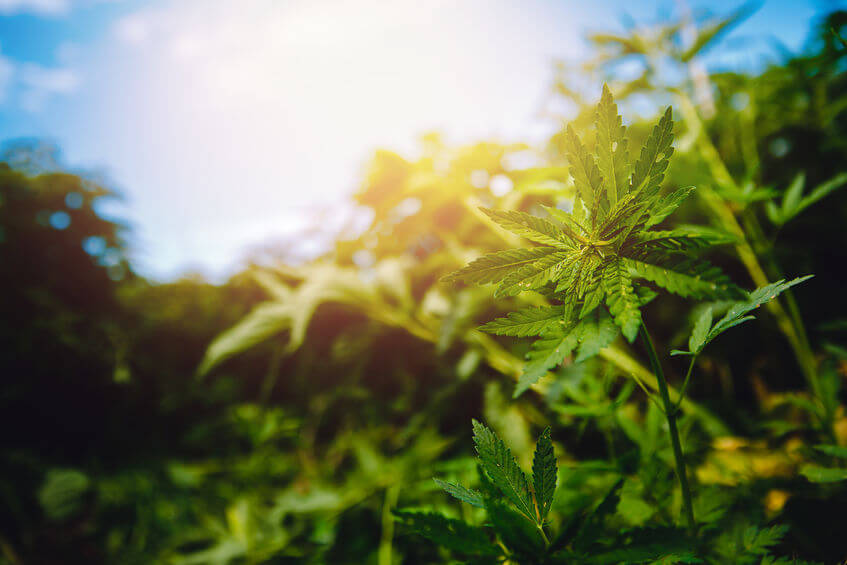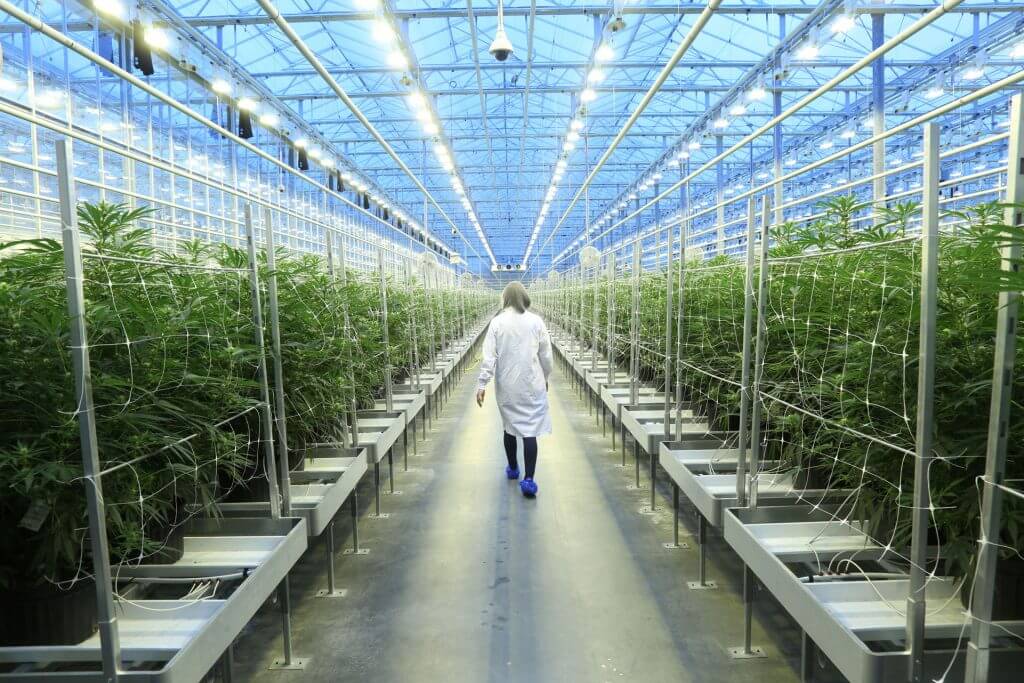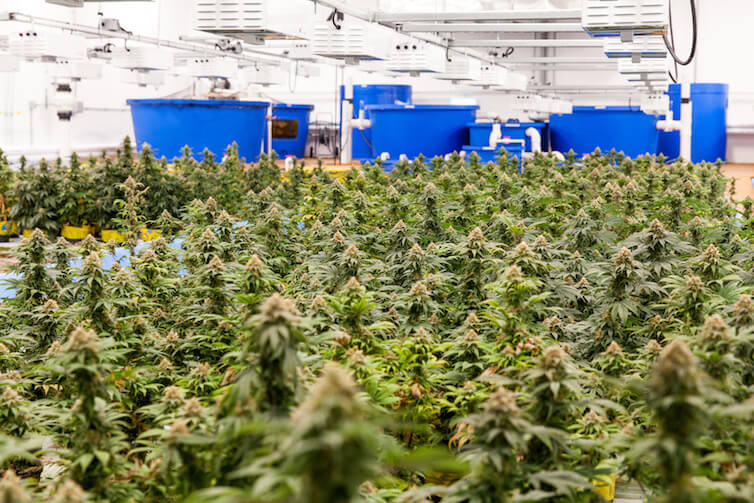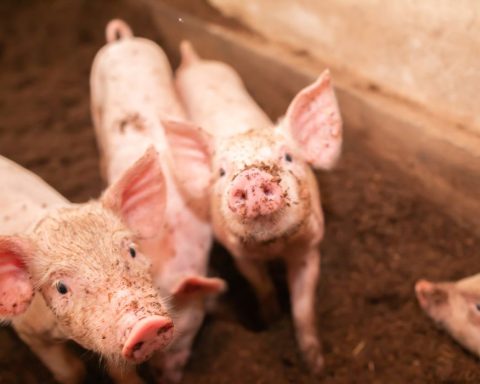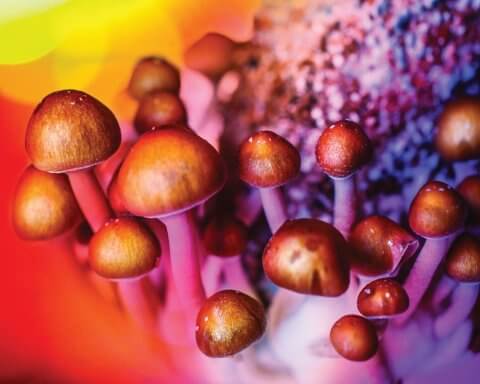If you pass the goats grazing on the hillside, you’ve missed it. Up a long country driveway at a ranch-style farm house in Ancaster, Ontario, there’s no sign telling visitors they’ve arrived at Canada’s largest licensed producer of organic cannabis. Just a badminton net. “We’re trying to give it a Google-type feel,” says VP of government affairs and social responsibility Ian Wilms on a tour of the grounds. “Employees keep asking if we’re going to start goat yoga soon.”
Wilms, a former IBM exec and chair of the Calgary Police Commission, and one of his partners had launched an LED lighting business when they decided to scope out the lighting booths at a cannabis convention. That’s when they got the bright idea to get into the cannabis business free of chemical pesticides and powered by LEDs instead of the searing high-pressure sodium lights singled out for ravenously consuming anywhere from 1 to 3% of the American grid (data is sketchy in Canada).
The Green Organic Dutchman is so far one of only a handful of companies in Canada licensed to produce certified organic cannabis. But the publicly traded firm is part a budding movement among cannabis companies trying to prove to investors, as well as customers, that they’re taking sustainability seriously, and that delivering greener pot will grow their bottom line.
In the nine months since the sector was officially un-cuffed, more and more cannabis companies have been coming out of the shadows of indoor grow-ops and capitalizing on free solar energy with hybrid greenhouses to cut energy use and curb costs. Companies like TGOD, Hexo, and even larger players like Aurora and Canopy Growth are shifting to high-tech, walled-in, glass-roofed greenhouses, as are brands explicitly promoted as “sungrown,” like Tantalus Labs and Aphria’s Solei.
Grow your pot in a greenhouse and you’ll use up to 90% less electricity than the old school indoor variety. This means significant greenhouse gas (GHG) savings for those with grow-ops in, say, Alberta (like Aurora and Canopy), whose grid is nearly 50% coal. And while Canada was recently accused of blowing its chance to be the world’s pot leader, BC and Quebec’s clean hydro-dominated grids could help us become a global centre for low-carbon cannabis.
Graphic from Tantaluslabs.com
One way or another, it looks like the sungrown label is on track to be the next “grass-fed” or “cage-free.” There’s a Certified SunGrown seal emerging out of California. The International Cannabis Farmers Association, Cannabis Conservancy and Certified Kind have come together to create the Sun+Earth certification (funded by Dr. Bronner’s soap company). Sun+Earth certifies small scale craft cannabis grown entirely outdoors by fairly-paid farmers (mostly in California, for now). 48North’s Ontario-based Good Farm brand will be Canada’s first licensed cannabis producer that’s both field-grown and organic.
Organic or not, it’s fair to say much of Canada’s legal cannabis sector has been heavily focused on ramping up supply. But in the frenzy to deliver masses of pot and quell investor impatience, most cannabis corporations haven’t put much thought into tracking, disclosing and bettering the ESG (environmental, social and governance) indicators that are the norm in virtually every other corporate sector. Dig around for the kind of detailed corporate social responsibility and sustainability reports you’d even find on oil industry websites and you’ll be left wanting. At best, canna companies are coughing up blurbs here and there.
“We’re a little bit like awkward teenagers,” Aphria’s chief legal officer, Christelle Gedeon told IdeaCity conference-goers in Toronto last month. “There’s some cost to growing up as teenager in front of world.”
Aphria should know. The Leamington, Ontario-based cannabis company became the poster-child for poor governance (the G in ESG) in late 2018 when it was accused of insider short-selling. Earlier this week, Vaughan, Ontario-based CannTrust acknowledged it hid unlicensed growing rooms from Health Canada. In 2016 and early 2017, OrganiGram, Aurora and a Canopy subsidiary recalled certified organic medical cannabis tainted with illegal pesticides. Since then, class action lawsuits seeking millions in damages have been launched against all three companies.
Fresh polling of 600 pensions, endowments, and sovereign wealth funds with US$21.5 trillion in assets around the globe has made it pretty clear that the majority of large investors see putting money into companies that ignore environmental, social, and governance indicators as a material risk to their portfolios.
The message to rapidly expanding cannabis corporations is loud and clear: if you want more of our green, you’d better show us how green you are.
Last month, a group called the Global Cannabis Partnership (45 cannabis-involved companies including TGOD, Aphria, Canopy, Hexo) released a Responsible Cannabis Framework that sets up basic corporate social responsibility standards for its members. It doesn’t offer guidance on hot button issues like plastic packaging (which is mostly non-recyclable) or fair wages, but it does require that members track and disclose their GHGs, as well as develop ethical codes of conduct, the way, say, the apparel sector started doing way back in the 90s.
Hexo’s glass-roofed greenhouse in Gatineau, Quebec
“Other sectors developed these types of standards after child labour scandals, explosions [at factories] in other countries or people chaining themselves to trees,” says framework author Rick Peterson. “This is the very first industry ever to commit to getting good corporate citizenship right out of the gates.”
Well, not quite right out of the gates. ESG-rating firm Sustainalytics took a first look at the budding industry’s ESG considerations in a report released last July scoring Canada’s four biggest cannabis producers. Most of the companies scored zero.
Sustainalytics research manager, Martin Vezér, admits the industry is in its infancy but says, “We have high expectations. Some of them are expanding from the medical market into the recreational market, and the medical market should have already been working on some of these factors such as governance and disclosing information about environmental management and pesticides.”
In signing onto the framework, members have a year to start tracking and disclosing that data and, if they choose, get accredited. Several Canadian pot firms are also in the midst of seeking accreditation through the Colorado- and Nelson-B.C.-based Cannabis Conservancy, which does energy, waste, land use and pesticide audits before doling out its Simply Eco seal.
“The cannabis sector is growing rapidly, and with that growth comes the privilege of being able to demonstrate to the world that we can be responsible to our physical and social environments while providing world class products to consumers,” says Hexo’s VP of corporate social responsibility, Terry Lake, who also happens to be B.C.’s former environment minister. This spring, the company harvested the first plants from its million-square-foot glass-topped greenhouse in Gatineau. It’s piloting LED lights in a portion of that hydro-powered greenhouse, which also gets 40% of its water from captured rain and recycled H20.
At a time when even conventional players are trying to green their game to curb costs and court investors, which cannabis companies are going the extra green mile? Check out our roundup below.
The other million-dollar question is whether Canadian consumers will fork out for greener bud the way they have for organic foods. Research from Hill+Knowlton found 57% of medical patients would prefer organic cannabis, but what about recreational users? The survey found 43% of recreational users had the same preference. The trouble is so far, organic cannabis can still be hard to find. Search for “organic” in the provincially-run online cannabis stores in Ontario, Quebec and Alberta and no buds come up (odd, considering the Ontario Cannabis Store carries Whistler Cannabis’ organic products). And when you do find them, organic strains can clock in at up to twice the price. Though Rubicon Organics and Green Farm say they’ll deliver organic marijuana for less.
And with some tokers falsely assuming that all weed is eco-friendly (blame it on hemp fabric’s sustainable rep), greener brands, no doubt, have an uphill education battle ahead of them.
Either way, TGOD’s Wilms says sustainability will be critical to the sector’s long-term health, especially if it’s serious about risk management. “If you’re not doing this in a sustainable manner,” Wilms affirms, “you won’t be successful.”
CANADA’S GREENEST CANNABIS COMPANIES
Here’s a roundup of some of the most eco-friendly pot producers in Canada. Since electricity is a main ingredient in most cannabis in this country, we calculated what percentage of each company’s grid is considered renewable. Note that the federal ‘Canada Organic’ label won’t be appearing on cannabis products anytime soon, since use of that red, green and black logo is still restricted to food.
Whistler Cannabis Co. (Aurora)
Maybe it’s no surprise that Canada’s first certified organic producer was born in B.C. Whistler started as an organic medical marijuana producer five years ago and in January 2019 the company was purchased by Canada’s third largest cannabis producer, Aurora, for a cool $175 million. All of which may help to explain why, so far, this established player is the only organic weed available at the Ontario Cannabis Store, though note the retail price is $20/gram (it’s $2 cheaper in B.C.).
Clean grid: 95%
Organic: 100%
Good Farm (48North)
Canada’s first licensed open-air pot crop is not just grown organically — it also happens to be led by women. Last fall, 48North purchased Good & Green (now Good Farm) and both companies had female CEOs (now co-CEOs), including one of the co-founders of The Green Organic Dutchman Jeannette VanderMarel. The 100-acre property in Brant County, Ontario plans to deliver 40,000 kg of organic, sun-grown, outdoor cannabis a year. Like Rubicon, 48North promises low-cost organics, with cultivating costs pegged at $0.25 per gram (well below indoor operations). No word on expected retail price but it should be in stores in Ontario, Quebec and Alberta by Christmas.
Clean grid: 100% (outdoor)
Organic: 100% (the fields have been certified but the final product has yet to be)
Tantalus Labs
This privately held Vancouver-based company has been called the Tesla of cannabis. Founder Dan Sutton has said he’s “leading a cultural revolution in sustainable cannabis cultivation” and is pushing the sungrown label as the future of pot. Tantalus’ SunLab uses mostly, what else, natural sunlight and exclusively recaptured rainwater in its greenhouse in B.C.. It’s not certified organic, though the company says it doesn’t use chemical inputs to treat mildew or pests (would be great to see third-party certification here). Available in B.C., Alberta and Saskatchewan. Starting price $15/gram.
Clean grid: 95%
Organic: –
Green Relief
Green Relief’s blue tanks are filled with tilapia, whose waste is siphoned to fertilize thousands of cannabis plant roots.
This Hamilton-based company says it’s the world’s only licensed cannabis producer using aquaponics—a closed loop system where essentially 6,000 tilapia keep the roots of 4,500 pot plants fertilized at a time in an LED-lit underground bunker. Green Relief’s system claims to produce 10 times the crop yield per acre and uses 90% less water than conventional farming. Every month, a few hundred fish are donated to local homeless shelters through Second Harvest. At this point, its plants are only for the medical market. Not organic, but word is some certified organic options may be in the works, as are new facilities in Thunder Bay and Nova Scotia. It also plans to go public later in 2019.
Clean grid: 37%
Organic: 0
Solei by Aphria
This mostly sungrown pot comes from Aphria’s greenhouse in Leamington, Ontario, supplemented by energy-saving LEDs. It has its own co-generation plant that produces electricity, plant growth-boosting CO2 and hot and cold water, trimming Solei’s carbon footprint. Solei makes no claims to be organic, but it does estimate that its operation uses 1/12 the power of other indoor grow ops. Like most big players, Aphria says it’ll firm up those numbers once it finishes monitoring the water, GHG and energy savings of its first year of operations.
Clean grid: 37%
Organic: 0
Rubicon Organics
![]() Canada’s fourth certified organic licensed producer was founded by the guys who started Whistler Medical Marijuana Corporation. It’s got a 125,000 square foot facility running on B.C.’s clean hydro grid and another 40,000 square foot greenhouse in Washington State whose grid is 2/3 low-emission hydro and 1/3 fossil fuels. Rubicon Organics claims to have figured out how to produce organic cannabis in high-yield hybrid greenhouses at an ultra-low cost of $0.50/gram. (Rubicon compares that to Aphria, which has said it can deliver dried flowers for between $0.90 and $1.30, while selling grams for an average of about $9.)
Canada’s fourth certified organic licensed producer was founded by the guys who started Whistler Medical Marijuana Corporation. It’s got a 125,000 square foot facility running on B.C.’s clean hydro grid and another 40,000 square foot greenhouse in Washington State whose grid is 2/3 low-emission hydro and 1/3 fossil fuels. Rubicon Organics claims to have figured out how to produce organic cannabis in high-yield hybrid greenhouses at an ultra-low cost of $0.50/gram. (Rubicon compares that to Aphria, which has said it can deliver dried flowers for between $0.90 and $1.30, while selling grams for an average of about $9.)
Clean grid: 90%
Organic: 100%
The Green Organic Dutchman
This Ancaster-based company plans to be the largest licensed certified organic cannabis globally, particularly once its million square foot LEED-certified greenhouse in Valleyfield, Quebec is up and running on renewable hydro power later this year. Combined with a Blue Mountain, Jamaica-based grow-op and greenhouses in Poland and Denmark in the works, TGOD promises to deliver over 200,000 kg of organic cannabis a year. Right now, it’s only selling to medical consumers (in glass jars) but it will be launching its recreational products in Ontario in mid-August. (Full disclosure: my spouse insisted we use the puny stash of funds gathering dust in my tax-free savings account to start investing in green stocks and TGOD was the first stock he purchased for me as my unofficial kitchen table investor. Naturally, it’s been one of the most anemic pot stocks on the market to date, so don’t consider this investment advice.)
Clean grid: 37% (90 once Quebec facility comes online)
Organic: 100%
Correction: An earlier version of this story stated that Ian Wilms is a co-founder of TGOD. He is a founding partner of TGOD Holdings Ltd, which purchased TGOD from Jeannette VanderMarel and Scott Skinner in 2016.


